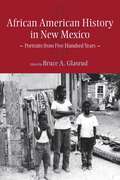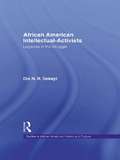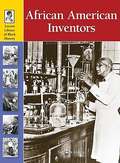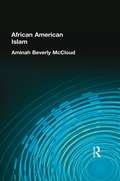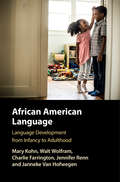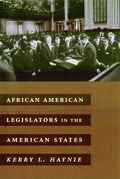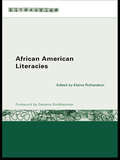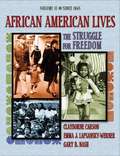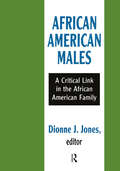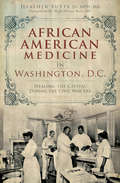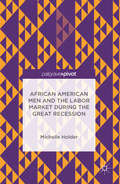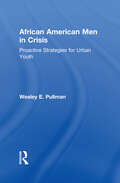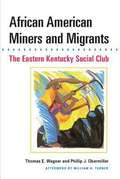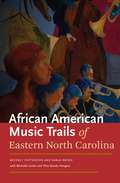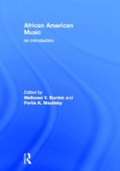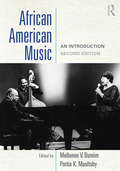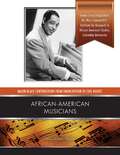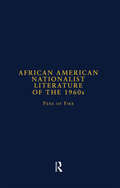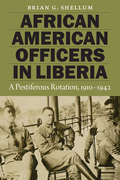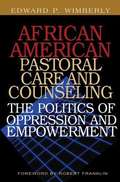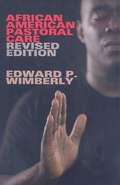- Table View
- List View
African American History in New Mexico: Portraits from Five Hundred Years
by Bruce A. GlasrudAlthough their total numbers in New Mexico were never large, blacks arrived with Spanish explorers and settlers and played active roles in the history of the territory and state. Here, Bruce Glasrud assembles the best information available on the themes, events, and personages of black New Mexico history.The contributors portray the blacks who accompanied Cabeza de Vaca, Coronado and de Vargas and recount their interactions with Native Americans in colonial New Mexico. Chapters on the territorial period examine black trappers and traders as well as review the issue of slavery in the territory and the blacks who accompanied Confederate troops and fought in the Union army during the Civil War in New Mexico. Eventually blacks worked on farms and ranches, in mines, and on railroads as well as in the military, seeking freedom and opportunity in New Mexico&’s wide open spaces. A number of black towns were established in rural areas. Lacking political power because they represented such a small percentage of New Mexico&’s population, blacks relied largely on their own resources and networks, particularly churches and schools.
African American History: Journey of Liberation (2nd Edition)
by Molefi K. AsanteThis book is a new history or historiography, a new way of writing about history. The author's task in writing this book was to capture the African agency, the action, and the excitement of this marvelous history.
African American Holidays: A Historical Research and Resource Guide to Cultural Celebrations
by James C. AnyikeAnyike provides the reader with a comprehensive blueprint on how to celebrate 'holy days'. This excellent book will inspire African Americans to take the days seriously while enjoying the celebrations.
African American Inequality in the United States
by Janice H. Hammond A. Kamau Massey Mayra GarzaThis note describes how historical and on-going policies and practices that discriminate against African Americans led to present-day inequality. Topics include slavery, segregation, Jim Crow laws, "black codes," and policies and practices relating to criminal justice, housing, and education.
African American Intellectual-Activists: Legacies in the Struggle (Studies in African American History and Culture)
by Dia N. SekayiThis study examines the narrated life experiences of 11 African American intellectual-activists. An intellectual-activist is defined as a person whose education has provided him or her with a body of knowledge to which he/she is continually adding (intellectual self) and who works daily for, or has a career dedicated to, the betterment of African American people (activist self). The voices of the subjects focus on the events in their lives that contributed to their development as intellectuals and activists. Discussions of the individuals' backgrounds illuminate the forces that influenced their life experiences and guided their actions toward involvement with the struggle to improve the lives of the African American community. The overarching theme in these life stories is the possession of a positive African American self-concept. The study explores the ways in which the subjects developed this positive self-concept, how this self-concept influenced the goals of their activism, and how they define progress toward these goals.
African American Inventors (Lucent Library of Black History)
by Stephen CurrieThis survey of African-American inventors includes some familiar names, but more whose names are less recognizable than their work. The stories of these bright and ambitious individuals are about science, technology, and individual discovery, but also about what it means - and what it has meant - to be black in the United States. Profiles of the most prominent inventors during each era of American history illustrate how blacks were viewed in society, as well as how they perceived themselves and how they functioned as a community through time.
African American Islam
by Aminah Beverly McCloudIslam is a vital, growing religion in America. Little is known, however, about the religion except through the biased lens of media reports which brand African American Muslims as "Black Muslims" and portray their communities as places of social protest. African American Islam challenges these myths by contextualizing the experience and history of African American Islamic life. This is the first book to investigate the diverse African American Islamic community on its own terms, in its own language and through its own synthesis of Islamic history and philosophy.
African American Language: Language development from Infancy to Adulthood (Language In Society Ser. #7)
by Walt Wolfram Mary Kohn Charlie Farrington Jennifer Renn Janneke Van HofwegenFrom birth to early adulthood, all aspects of a child's life undergo enormous development and change, and language is no exception. This book documents the results of a pioneering longitudinal linguistic survey, which followed a cohort of sixty-seven African American children over the first twenty years of life, to examine language development through childhood. It offers the first opportunity to hear what it sounds like to grow up linguistically for a cohort of African American speakers, and provides fascinating insights into key linguistics issues, such as how physical growth influences pronunciation, how social factors influence language change, and the extent to which individuals modify their language use over time. By providing a lens into some of the most foundational questions about coming of age in African American Language, this study has implications for a wide range of disciplines, from speech pathology and education, to research on language acquisition and sociolinguistics.
African American Legislators in the American States (Power, Conflict, and Democracy: American Politics Into the 21st Century)
by Kerry HaynieHas black inclusion in the political process changed political institutions and led to more black influence in the governmental process? How do African American legislators balance racial interests with broader issues of government? And how is their effectiveness subjectively perceived and objectively evaluated?In one of the first book-length studies to analyze the behavior of African American state legislators in multiple legislative sessions across five states, Kerry Haynie has compiled a wealth of valuable data that reveals the dynamics and effectiveness of black participation in the legislative process. Owing to the increasing role of state government in administering what he defines as key "black issues"— education, healthcare, poverty/social welfare, civil rights, and children's issues—Haynie focuses on bills introduced in these categories in Arkansas, Illinois, Maryland, New Jersey, and North Carolina.The book reveals how responsive political institutions have been to the nation's largest minority group. It explores the question of how legislators deal with the "duality dilemma"—which requires them to be both responsible legislators and race representatives—and whether agendas should be "deracialized" in order to appeal to a broader constituency. Along with numerous statistical charts illustrating everything from representation on house standing committees to a ranking of the fifteen legislative sessions by quartiles of African American political incorporation, a useful and revealing portrait emerges—one that will fuel debate and inform future discussions of the role of African Americans in the political process.
African American Literacies (Literacies)
by Elaine RichardsonAfrican-American Literacies is a personal, public and political exploration of the problems faced by student writers from the African-American Vernacular English (AAVE) culture.Drawing on personal experience, Elaine Richardson provides a compelling account of the language and literacy practices of African-American students. The book analyses the problems encountered by the teachers of AAVE speakers, and offers African American centred theories and pedagogical methods of addressing these problems. Richardson builds on recent research to argue that teachers need not only to recognise the value and importance of African-American culture, but also to use African-American English when teaching AAVE speakers standard English.African-American Literacies offers a holistic and culturally relevant approach to literacy education, and is essential reading for anyone with an interest in the literacy practices of African-American students.
African American Literature: Voices in a Tradition
by Holt Winston RinehartAfrican American Literature Anthology for High School students
African American Lives: The Struggle for Freedom Volume II
by Gary B. Nash Clayborne Carson Emma J. Lapsansky-Werner'African American Lives, American History' uses a biographical approach to present African Americans as active and thoughtful agents in the construction of their lives and communities. Each chapter opens with a vignette focusing on an individual involved in a dramatic moment or event. Personal stories are told throughout the narrative.
African American Males: A Critical Link in the African American Family
by Dionne J. JonesAfrican American families have demonstrated their strengths and survival skills through many generations, from slavery to the present time. As the African American middle class has grown over the last two decades, so have their numbers among elected officials and in business. Despite this, African Americans are experiencing extreme stress, but African American males appear to suffer the most. The disproportionate share of African American male inmates in the United States, the high homicidal rate, the astronomical rise and spread of the AIDS virus, and the continuing growth of drug abuse, all suggest that the African American male may be becoming an endangered species. In order to save the African American family. the structural and environmental conditions that give rise to these negative conditions must be studied. The chapters in this volume address some of the pressing issues affecting African American men. Chapters and contributors include: "Reaffirming Young African American Males: Mentoring and Community Involvement by Fraternities and Other Groups" by Dionne J. Jones. Victor E. Bibbins, and Ronald D. Henderson; "Health Status of African American Men" by Lawrence E. Gary; "Urban Adolescent Homicidal Violence: An Emerging Public Health Concern" by Ronald K. Barrett; and "Pastoral Counseling with African American Men" by Edward P. Wimberly. African American Males affirms that this segment of the population is a precious resource, and as such, they must be nurtured throughout their lives. The current situation makes for structural unbalance in American society as a whole, no less than within African American communities as such. This book will be of interest to sociologists, psychologists, and black studies specialists.
African American Medicine in Washington, D.C.: Healing the Capital During the Civil War Era
by Heather ButtsThe true story of the black doctors and nurses who tended to Civil War soldiers in the capital. Just as African Americans fought in defense of the Union during the Civil War, African American nurses, doctors, and surgeons worked to heal those soldiers. In the nation&’s capital, these brave healthcare workers created a medical infrastructure for African Americans, by African Americans. Preeminent surgeon Alexander T. Augusta fought discrimination, visited President Lincoln, testified before Congress, and aided the war effort. Washington&’s Freedmen&’s Hospital was formed to serve the District&’s growing free African American population, eventually becoming the Howard University Medical Center. These physicians would form the National Medical Association, the largest and oldest organization representing African American doctors and patients. This book recounts the heroic lives and work of Washington&’s African American medical community during the Civil War.
African American Men and the Labor Market during the Great Recession
by Michelle HolderThis book analyzes the status and position of African American men in the U.S. labor market prior to, during, and after the Great Recession. Using a model of occupational crowding, the book outlines how the representation of African American men in major occupational categories almost universally declined during the recent recession even as white non-Hispanic men were able to maintain their occupational representation in the face of staggering job losses. Using US Census Bureau data, this book illustrates how African American men sought to insulate their group from devastating job losses by increasing their educational attainment in a job market where employers exercised more leverage in hiring. However, this strategy was unable to protect this group from disparate job losses as African American men became further marginalized in the workforce during the Great Recession. Policy approaches to address high African American male unemployment are outlined in the final chapter.
African American Men in Crisis: Proactive Strategies for Urban Youth (Children of Poverty)
by Wesley E. PullmanFirst published in 1995. Routledge is an imprint of Taylor & Francis, an informa company.
African American Miners and Migrants: THE EASTERN KENTUCKY SOCIAL CLUB
by Thomas E. Wagner Philip J. ObermillerThomas E. Wagner and Phillip J. Obermiller's African American Miners and Migrants documents the lives of Eastern Kentucky Social Club (EKSC) members, a group of black Appalachians who left the eastern Kentucky coalfields and their coal company hometowns in Harlan County. Bound together by segregation, the inherent dangers of mining, and coal company paternalism, it might seem that black miners and mountaineers would be eager to forget their past. Instead, members of the EKSC have chosen to celebrate their Harlan County roots. African American Miners and Migrants uses historical and archival research and extensive personal interviews to explore their reasons and the ties that still bind them to eastern Kentucky. The book also examines life in the model coal towns of Benham and Lynch in the context of Progressive Era policies, the practice of welfare capitalism, and the contemporary national trend of building corporate towns and planned communities.
African American Music Trails of Eastern North Carolina
by Sarah Bryan Beverly Patterson Michelle LanierThelonius Monk, Billy Taylor, and Maceo Parker--famous jazz artists who have shared the unique sounds of North Carolina with the world--are but a few of the dynamic African American artists from eastern North Carolina featured in The African American Music Trails of Eastern North Carolina. This first-of-its-kind travel guide will take you on a fascinating journey to music venues, events, and museums that illuminate the lives of the musicians and reveal the deep ties between music and community. Interviews with more than 90 artists open doors to a world of music, especially jazz, rhythm and blues, funk, gospel and church music, blues, rap, marching band music, and beach music. New and historical photographs enliven the narrative, and maps and travel information help you plan your trip. Included is a CD with 17 recordings performed by some of the region's outstanding artists.
African American Music: An Introduction
by Mellonee Burnim Portia K. MaultsbyAfrican American Music: An Introduction is a collection of thirty essays by leading scholars which survey major African American musical genres, both sacred and secular, from slavery to the present. It is the most comprehensive study of African American music currently available, with sixteen essays on major genres of African American music, as well as lengthy sections on the music industry, gender, and music as resistance. The work brings together, in a single volume, treatments of African American music that have existed largely independent of each other. The research is based in large part on ethnographic fieldwork, which privileges the voices of the music-makers themselves, while interpreting their narratives through a richly textured mosaic of history and culture. The book is replete with references to seminal recordings and recording artists, musical transcriptions, photographs, and illustrations that bring the music to life as expressions of human beings.
African American Music: An Introduction
by Portia K. Maultsby Mellonee V. BurnimAmerican Music: An Introduction, Second Edition is a collection of seventeen essays surveying major African American musical genres, both sacred and secular, from slavery to the present. With contributions by leading scholars in the field, the work brings together analyses of African American music based on ethnographic fieldwork, which privileges the voices of the music-makers themselves, woven into a richly textured mosaic of history and culture. At the same time, it incorporates musical treatments that bring clarity to the structural, melodic, and rhythmic characteristics that both distinguish and unify African American music. The second edition has been substantially revised and updated, and includes new essays on African and African American musical continuities, African-derived instrument construction and performance practice, techno, and quartet traditions. Musical transcriptions, photographs, illustrations, and a new audio CD bring the music to life.
African American Musicians (Major Black Contributions from Emancipat)
by Claudette HegelAfrican Americans--famous and anonymous alike--have helped shape popular musical genres ranging from jazz and blues to rock 'n' roll and rap. This book provides a vivid account of that process, beginning with the work songs and spirituals of slaves and continuing up to the present. African-American Musicians tells the stories of figures such as bluesman Robert Johnson, whose guitar playing was so extraordinary that people said he must have made a deal with the devil; jazz great Duke Ellington, considered one of America's greatest composers and bandleaders; classical singer Marian Anderson, who struck a blow for civil rights with her music; Michael Jackson, the "King of Pop"; and many, many more.
African American Nationalist Literature of the 1960s: Pens of Fire (Studies in American Popular History and Culture)
by Sandra Hollin FlowersBringing together political theory and literary works, this study recreates the political climate which made the 1960s an unforgettable era for young black Americans. A chapter on "The Many Shades of Black Nationalism," for instance, explains: why black nationalism is known by more than a dozen different names; how events in Africa influenced black nationalism in America; why Malcolm X's death had a greater impact on nationalism than did his life; and how the United States government unwittingly became nationalism's ally. Another chapter explores the bitter feud between the dominant factions of the 1960s-cultural and revolutionary nationalists. This feud erupted in both verbal and armed warfare and generated an abundance of political theory and literary works, much of which is out of circulation but is examined in the study. Nationalist poetry, theater, and fiction are each treated in separate chapters which exemplify the aesthetic and political concerns of this memorable period in American history and letters. Aside from its unique combination of artistic and political works, what makes this book important is the current revival of nationalist sentiment in African American life and arts. Though this revival is closely identified with the nationalism of the 1960s, it lacks the focus of that period. This study explains what gave the nationalism of the 1960s its focus, how that focus was expressed in art forms, and why 1960s nationalism continues to influence the African American identity and will probably do so well into the twenty-first century.
African American Officers in Liberia: A Pestiferous Rotation, 1910–1942
by Brian G. ShellumAfrican American Officers in Liberia tells the story of seventeen African American officers who trained, reorganized, and commanded the Liberian Frontier Force from 1910 to 1942. In this West African country founded by freed black American slaves, African American officers performed their duties as instruments of imperialism for a country that was, at best, ambivalent about having them serve under arms at home and abroad. The United States extended its newfound imperial reach and policy of “Dollar Diplomacy” to Liberia, a country it considered a U.S. protectorate. Brian G. Shellum explores U.S. foreign policy toward Liberia and the African American diaspora, while detailing the African American military experience in the first half of the twentieth century. Shellum brings to life the story of the African American officers who carried out a dangerous mission in Liberia for an American government that did not treat them as equal citizens in their homeland, and he provides recognition for their critical role in preserving the independence of Liberia.
African American Pastoral Care and Counseling: The Politics of Oppression and Empowerment
by Edward P. WimberlyAll of these iterations of modern faith seem errant and in need of correction. African American Pastoral Care and Counseling may be just what we needed at this hour in history.
African American Pastoral Care: Revised Edition
by Edward P. WimberlyRespond to God's unfolding drama to bring healing and reconciliation. In this major revision of his classic book, Dr. Edward Wimberly updates his narrative methodology by examining current issues in African American pastoral care and counseling.
